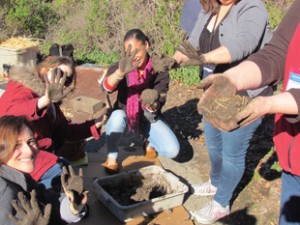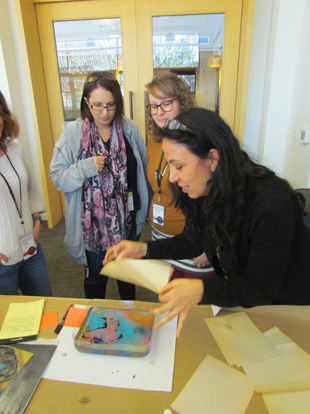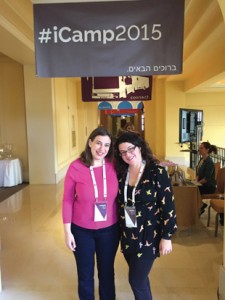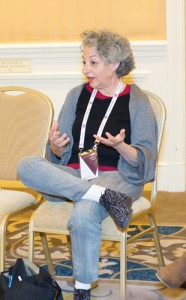 Entwine’s unique combination of service, educational and leadership opportunities is becoming a model for re-charging the Jewish identities of hard-to-reach young adults.
Entwine’s unique combination of service, educational and leadership opportunities is becoming a model for re-charging the Jewish identities of hard-to-reach young adults.
“We all have a responsibility for the other. Through JDC Entwine, we are able to live that and inspire other people to be able to do that,” says Perry Teicher, co-chair of the JDC Entwine Steering Committee.
“More and more of our generation understands that what’s happening in India can affect me. We understand that we are all interconnected. Entwine is the only Jewish organization that really taps into that concept of a global Jewish community,” says Raquel Benquiat, founder and former co-chair of Entwine’s San Diego planning committee.

A Cornell Hillel student and local Jewish peer help repaint a Hesed social welfare building in Ukraine as part of a JDC Entwine Short Term Service trip; courtesy JDC.
Benquiat, a 32-year-old San Diego resident originally from Mexico City, says that many of her peers are disconnected from their Jewish identities. But when they leave home and see the global Jewish perspective through Entwine they often connect – Judaism becomes less threatening.

A JDC Entwine service volunteer facilitating activities with villagers in rural Gondar, Ethiopia; courtesy JDC.
“You open up to Judaism and that never leaves you. You feel, ‘Oh, God! I am Jewish and there is tradition behind me and all these people around the world are doing similar things that I do, as a Jew. I should do more, make Judaism a stronger part of me,’” says Benquiat.
JDC Entwine – the American Jewish Joint Distribution Committee’s young adult engagement platform – has engaged more than 12,000 young Jewish adults, more than 50 percent whom fit the description that Benquiat provides, according to Executive Director Sarah Eisenman. An awardee of Slingshot’s 2014-2015 Washington DC innovator’s guide and a recipient of a $3 million grant from the Jim Joseph Foundation, Entwine is quickly growing. Its unique combination of service, educational and leadership opportunities is becoming a model for re-charging the Jewish identities of hard-to-reach young adults.
Eisenman – who utilized her experience and interests as a passionate, but largely unaffiliated, young Jewish adult to create Entwine – says the organization is “catalyzing a generation of young Jews to live a life of action with global Jewish responsibility at the core.”

Students from Tufts University Hillel on a JDC Entwine trip working on a craft project with Jewish children who attend the Baby Help program in Buenos Aires; courtesy JDC.
Most unique are Entwine’s strategic partnerships, which enable it to collaborate to reach more – and a more diverse group – of future Jewish leaders.
For example, in June 2015, Entwine announced a partnership with Genesis Philanthropy Group (GPG), to launch the first global Jewish service program uniquely crafted for Russian-speaking Jewish young people. The cohort, once accepted, travels together on service trips and then return to their communities to plan programs that appeal to a Russian-speaking audience. Eisenman says, “The program has taken off in a significant way.”
Twenty-four-year-old Lizzy Solovey of Baltimore is one of the participants. She recently traveled to Argentina with a group of Russian-speaking peers.

A crowd of young Jewish professionals gather for “Young Jewish Europe: East Meets West,” a JDC Entwine Learning Network-Genesis Philanthropy Group event at NYC’s City Winery; courtesy JDC.
“It was so amazing to see how resilient the Jewish community is there after the economic crisis. It was even more powerful to go to Argentina with a Russian group, because our story resonates with theirs. They are not immigrants, but they are rebuilding their lives in the same way our parents and we did,” says Solovey, who now works as a Jewish communal professional. “We had wonderful discussions about what it means to be Jewish and Russian. Coming back, I realized how important it is that I stay involved – to be proud of where I come from and of where I am and to keep giving back.”
A second $4 million partnership between Entwine and BBYO – which includes lead funding from the Schusterman and William Davidson Foundations – is enabling young adults who were formerly involved in the BBYO youth movement to take part in service fellowships, using the skills they learned as teen leaders. It is estimated that as many as 80 percent of teens disengage from the Jewish community after their bar/bat mitzvah. Almost as many drop out during the college years.
“This is a unique collaboration because it leverages the best of what Entwine, JDC and BBYO have to offer,” explains Eisenman, who notes the unique nature of Jewish young adults creating pluralistic teen programming through Entwine’s one-year Global Jewish Service Corps in Jewish communities where there is a need to develop teen programming. The volunteers use their preexisting skill sets to work with teens from around the world, which leads to more young adults serving and members of teen movements staying involved, and brings a pluralistic Jewish perspective to more traditionally-minded communities.
Moishe House has also partnered with JDC Entwine for several years. The collaboration has benefitted both organization in a number of ways with residents on service experiences, Moishe Houses serving as platforms for Entwine educational events, and often Entwine participants get involved in Moishe Houses on their return from overseas. This partnership has fostered a larger cooperation between Moishe House and JDC globally, whereby the two organizations develop Moishe Houses in overseas Jewish communities.
While JDC is known for regularly reinventing itself based on historical norms of that time and being able to reorient itself to respond to pressing challenge in the Jewish world – and Entwine is certainly a part of that mindset and mission – Entwine is conversely impacting JDC. For example, JDC changed it bylaws to create a two-year board position for young adults in their 20’s and 30’s, which now bring a new perspective to the organization’s strategy.
“People talk about experiential learning. This will be experiential leadership,” Eisenman quips, noting that among the goals of JDC Board inclusion of young adults is to put them in substantive leadership roles now while also exposes them to high-level learning on global leadership and interventions.
Entwine’s Teicher says he is focused on helping determine in what cities JDC Entwine should have larger networks, new ways to engage people, creative events, and how social media can impact the work JDC and its Entwine initiative do.
“The opportunity to work within such an amazing organization that has done such outstanding work for so long is really meaningful personally,” Teicher explains.
Benquiat expressed similar sentiments, highlighting what she feels is JDC Entwine’s secret sauce: entrepreneurialism.
“Entwine is not a pet project for the larger organization. No one dictates what we can and should do. We own what we do and we feel responsible for our own programs,” Benquiat says.
Will it last? That is something that Eisenman says she is shouldering. As part of the Jim Joseph grant, Entwine will embark on a long-term data mining project to evaluate the short-term and long-term success of its current initiatives and help inform future offerings.
“We care deeply about evaluation and data. We know the model is good; Entwine has done internal surveys,” says Dawne Bear Novicoff, assistant director of the Jim Joseph Foundation. “But Entwine has not had the resources to evaluate it. … Entwine will hire a new staff person to focus on measurement and outcomes to track and analyze the data it is already collecting.”
Powerful. Authentic.
Says Eisenman: “We have built. Now, we are taking everything we built and putting it on a whole new level.”
Source: “JDC Entwine’s Entrepreneurialism is Secret Sauce for Engaging Next Generation,” Maayan Jaffe, eJewishPhilanthropy, October 16, 2015


 What do a religious start-up, a spiritual cooperative and 570-plus households in a high school have in common?
What do a religious start-up, a spiritual cooperative and 570-plus households in a high school have in common? The San Francisco-based
The San Francisco-based  Some 250 Jewish educators, educational leaders and funders spent three days in Las Vegas last month discussing and learning new strategies for teaching the subject of Israel to Jews in North America.And, in this case, the hope is that what happened in Vegas won’t stay in Vegas.
Some 250 Jewish educators, educational leaders and funders spent three days in Las Vegas last month discussing and learning new strategies for teaching the subject of Israel to Jews in North America.And, in this case, the hope is that what happened in Vegas won’t stay in Vegas.

 Hot on the heels of a report showing major gaps in American-Jewish college students’ knowledge about the State of Israel, some 250 Jewish educators, funders and other stakeholders gathered in Las Vegas for a three-day conference on Israel education.
Hot on the heels of a report showing major gaps in American-Jewish college students’ knowledge about the State of Israel, some 250 Jewish educators, funders and other stakeholders gathered in Las Vegas for a three-day conference on Israel education. I recently got a call from a friend who graduated from a top business school and was considering three great job offers: one doing marketing with a professional sports team; one as an account manager with a tech start up; and, one doing development with a Jewish Federation. He was seeking my advice about which position to accept.
I recently got a call from a friend who graduated from a top business school and was considering three great job offers: one doing marketing with a professional sports team; one as an account manager with a tech start up; and, one doing development with a Jewish Federation. He was seeking my advice about which position to accept.
 As an educator and a parent, I know my task is not only to provide answers. I know that allowing children the opportunity to discover, question, challenge, and struggle is just as valuable, if not much more. But in times of crisis, in times where the news from Israel breaks my heart, I find it hard to remember that.
As an educator and a parent, I know my task is not only to provide answers. I know that allowing children the opportunity to discover, question, challenge, and struggle is just as valuable, if not much more. But in times of crisis, in times where the news from Israel breaks my heart, I find it hard to remember that.



 Two grants totaling $300,000 from the Jim Joseph Foundation and The AVI CHAI Foundation have provided scholarships for Jewish day schools, early childhood programs, and overnight camps to Houston-area families affected by May’s flood in America’s fourth-largest city.
Two grants totaling $300,000 from the Jim Joseph Foundation and The AVI CHAI Foundation have provided scholarships for Jewish day schools, early childhood programs, and overnight camps to Houston-area families affected by May’s flood in America’s fourth-largest city. (JTA) — Hillel International: The Foundation for Jewish Campus Life has received a $16 million grant from the Jim Joseph Foundation, the largest grant ever awarded by the foundation.
(JTA) — Hillel International: The Foundation for Jewish Campus Life has received a $16 million grant from the Jim Joseph Foundation, the largest grant ever awarded by the foundation. Three local Jewish day schools have started the second year of an initiative that aims to improve Israel experiences and education in Jewish day schools.
Three local Jewish day schools have started the second year of an initiative that aims to improve Israel experiences and education in Jewish day schools.